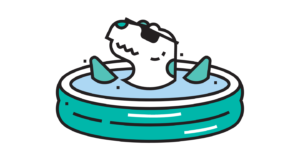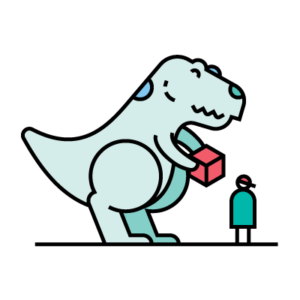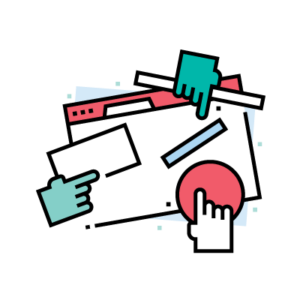At Mozilla, we talk a lot about transformation — especially when it comes to expanding our product portfolio beyond the Firefox browsers. While our family of products includes beloved platforms such as Pocket and our VPN alongside Firefox, there are plenty of fits and starts in our non-browser history, as well; our last big bet, Firefox OS, was discontinued in 2017.
Since becoming CEO in 2020, Mitchell Baker has encouraged us to think about how the growth we’re after will require mindset shifts — and not just in terms of what we’ll do next, but in how we’ll do it. As a mission-driven organization with a clearly defined purpose, we are skilled at describing the impact we want to make on the world; our mission and manifesto do just that. But we have far less practice talking about the behaviors that guide how we work together. Yet it’s those systems that will enable us to get things done in new ways and successfully deliver the impact we want.
We knew those behaviors needed to change, because you can’t transform an organization’s results without changing how you get those results. So last year, we decided to pinpoint the mindsets and behaviors holding us back from innovation, and develop a set of new operating values that would enable the collaboration, speedy decision-making, and risk-taking required to carry Mozilla into the future.

Identifying our challenges
We started by talking to Mozillians throughout the company to try to understand the current state of affairs. Did they feel safe taking risks? Did they see colleagues embracing innovation, or were they protecting the past?
One concern that emerged was the shrinking space for curiosity and debate. People join this team because they believe in the mission — Mozillians are smart, passionate and have strong feelings about our work. But when those feelings are stated too aggressively, it creates a distracting “us vs. them” dynamic. We end up with an environment where people who have a different point of view, or even just want to ask questions, don’t feel comfortable speaking up. That’s not healthy, and it leads to lower-quality decisions. Diverse viewpoints are key to taking risks, changing course, and doing new things, and without them, we’ll keep getting the same results.
Another, ancillary issue was that Mozilla, with deep roots in the open-source community, is not historically a high-trust environment. When the people you’re collaborating with show their work at every step, you don’t have to take anything on faith. But in practice, a “transparency at all costs” approach, where everyone gets to weigh in on everything, can make it difficult to finish projects. People may begin to break off into small, isolated groups and make decisions on their own. The result is the opposite of the participatory community processes that open source was intended to foster.
Developing our values
Once we’d analyzed where we were, the next step was to map where we wanted to go. Based on the input we received, along with the ideas expressed in our mission, manifesto, community participation guidelines and our three year product vision (to become the trusted guide to a joyful internet) we worked to define the specific, concrete behaviors we needed to create a safer environment for innovation. It was an iterative process (more than 200 people contributed), and ultimately led us to the four operating values below — what we call “V.1.”
|
|
We welcome differences.Welcoming differences is how we keep our minds open to what’s possible, push ourselves to challenge assumptions and make room for new ideas. We do it so every Mozillian can do their best work, and so we can uncover the solutions that come from diverse experiences and perspectives. Welcoming differences means we treat each other with dignity and respect; support one another; and own the impact of our words, actions and assumptions. When we disagree, we ask questions and seek to understand — by challenging ideas, not individuals. We recognize that our colleagues are here to support the mission, just like us. ~ |
|
|
We are relationship-minded.Being relationship-minded means taking the long view of our connections, both with each other and with the people we serve. With each other, we get to know the people behind the Slack messages by listening actively, finding common ground, and giving the gift of feedback, positive and negative alike. With the people we serve, we understand that Mozilla’s future — in which revenue comes not just from sponsored links, but from products people will pay for — depends on deeply understanding and empathizing with our users. When we get better at the messy work of relationship-building, we bring more joy and momentum to our daily interactions and more power to our products. ~ |
|
|
We practice responsible participation.Responsible participation is what allows our open-source history to be wind in our sails, instead of an anchor. It’s about striking a balance between transparency and getting things done. It means decision-makers are obligated to actively solicit diverse perspectives, take them seriously and communicate with stakeholders about their conclusions and how they reached them. For stakeholders and other Mozillians, it means reflecting on whether our input will be helpful, keeping it constructive when we do offer it, and gracefully accepting that it won’t always be acted upon. There is a difference between collaboration and consensus; we can disagree with but still support a well-informed decision. ~ |
|
|
We have grit.Mozillians need grit because we are here to do hard things, take on giants, and make a difference in people’s online lives. We are 800 people competing against the likes of Google, Apple and Facebook, so like David taking on Goliath, we must be creative and nimble. Grit is about not just tenacity, but also staying focused on our goal — and recognizing that time matters. We can’t afford to have the entire team weigh in on each decision, because we must move with urgency to make sure we don’t lose our opportunity for impact. Grit enables us to embrace imperfect ideas, learn quickly and be relentless about examining what works well and what does not. It helps us take the risks necessary to punch above our weight. |
Each of these four values builds on the next. When we welcome differences, we create the baseline of safety required to build relationships — which then enable the trust we need to practice responsible participation — which in turn empowers us to move quickly, get creative and ultimately realize our goals.
Making it real
Late last year, we officially announced our new operating values at an all company meeting, with members of the leadership team presenting on, and sharing examples of, each. But we know activating these values isn’t as simple as writing them down or even having our leaders advocate for them; we need each Mozillian to truly integrate them into their day-to-day work. So we set a specific goal: for 75% of employees participate in a program related to the operating values. Then we made that goal part of our companywide KPIs (key performance indicators), which are tied to team bonuses.
Every new hire at Mozilla — an estimated 200 people this year — will participate in a program automatically; our new onboarding curriculum includes a workshop introducing our operating values, along with breakout sessions to help put the values into practice. And for existing employees, we recently kicked off a six-month program, with multiple options for online sessions each month. In May, we gave a quick overview of all four values, with fun exercises to help make each of them real. During the following months, we’re offering deep dives on individual values — and encouraging each Mozillian to identify the value that feels most challenging to them, then be sure to attend one of those sessions. In October, we’ll do a final wrap-up.
This kind of work happens brick by brick, and we know we won’t see change overnight. But our hope is that as we continue to talk about these values — to weave them into our presentations, to talk about them with candidates, to refer to them in our daily chats — the new mindsets and behaviors will start to take hold. They’ll continue to evolve over time, just like our culture itself, and neither will ever be perfect. But while these operating values aren’t a panacea for the transformation we’re after, we do believe they’re an important step forward. With healthier collaboration, more risk-taking, and higher-velocity decision-making, we’ll be better prepared to move into the next phase of Mozilla’s future — and be the sustainable, multiproduct, thriving company we know we can be.
Interested in joining our team? Check out our open roles. |



